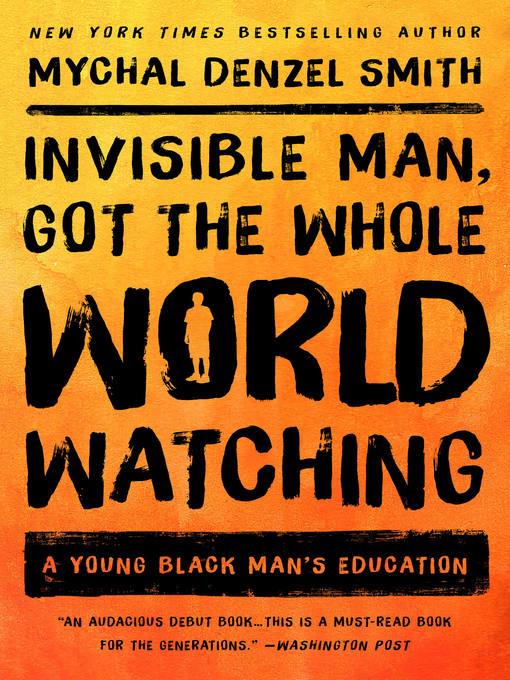
Invisible Man, Got the Whole World Watching
A Young Black Man's Education
کتاب های مرتبط
- اطلاعات
- نقد و بررسی
- دیدگاه کاربران
نقد و بررسی

May 15, 2016
As black men are cut down by the police and self-appointed vigilantes, an activist wrestles with competing claims--from his family and community, his historically black university, the media, and white America--on his blackness and how it is to be lived.Nation contributing writer Smith, who was raised in a strict military household and surreptitiously listened to hip-hop under the covers at night, writes of the tension between his straight-laced parents and the brash anti-establishment views of his artistic heroes. His political awakening was framed by a litany of names, men and boys like Trayvon Martin, whose death "places us in the unenviable position of wishing that our martyrs could have survived to become tokens." Voting for Barack Obama was his father's proudest memory, but the author did so unenthusiastically, feeling that the "potency of black political activism is undercut by the unfounded belief that we can find a place within the system and thrive." Smith uses deeply personal, often haunting imagery to describe his formative years at a historically black college and his struggles with mental illness that left him a few credits shy of a degree. He gradually came to realize that, in his internal worldview, women had been nearly as invisible and agentless as black men in the white imagination and that the names of black women and black gay men who meet similar fates as Martin are quickly forgotten. "We use our anger at the state as a justification for the violence we enact on black women, then tell them not to hold us accountable until we have defeated racism," he writes, and he connects sexism and homophobia to the structural and systematic oppression of black men in America. Realizing that he has more questions than answers, Smith cautiously sketches a useful blueprint for radical and intersectional politics in a country where a black child can grow up to be president but where living while black is still dangerous.
COPYRIGHT(2016) Kirkus Reviews, ALL RIGHTS RESERVED.

June 15, 2016
Black men have long been viewed as objects of dread whom most others in America prefer not to see, indeed typically cannot see as whole persons, argues Nation contributing writer Smith. In this work, the author, who was born in 1986 in Washington, DC, to a military family, unfolds his path to manhood, describing how boys in the black community are wrenched between the cautions and hopes of parents, elders, and community on the one side, and the dominant white culture in which black men are often stereotyped, on the other. As a result, these youth face the dangers and difficulties of classism, elitism, self-hatred, depression, and violence. Smith provides insightful notes on the personalities and politics represented by pointed markers in history, instances when blacks were being murdered, while also explaining how attending Hampton University (an HBCU, or historically black college and university) broadened his perspective. Smith's reflections, titled with a lyric from performer Mos Def's song "Hip Hop," shimmer with cultural commentary that should prompt all readers to do more than simply think or talk about the state of race in America in general (and black America in particular). VERDICT This book will appeal to those who enjoyed similar recent works such as Carol Anderson's White Rage and National Book Award winner Ta-Nehisi Coates's Between the World and Me.--Thomas J. Davis, Arizona State Univ., Tempe
Copyright 2016 Library Journal, LLC Used with permission.

Starred review from November 1, 2016
Smith picks up the conversation started in Ta-Nehisi Coates's Between the World and Me. Spurred by the pain surrounding recent shootings of young black males, he dissects white supremacy, misogyny, homophobia, transphobia, class-based elitism, self-hatred, violence, and untreated mental illness. If it sounds like a lot, it is, but don't be dissuaded; Smith is in control and delivers the message in short chapters, each with personal revelations and current cultural references. Young people will relate to his examination of Kanye West, LeBron James, Dave Chappelle, and Frank Ocean. Smith's honesty is raw and often funny ("I visited the campus once before deciding Hampton would be it, based on my highly sophisticated decision-making rationale: it just felt right, ya know?"), and his punches land squarely. Teens can't help but ponder the inequality of our nation's policies while also examining their effects on personal life. Smith challenges readers to ask the questions that will allow us to restructure, rephrase, and reconsider what we are ashamed of. What if we shifted our language to "invite in" all that is different from us? What if we no longer placed the burden of bravery on the marginalized, the people who try to fit into a hostile world? "Change is not inevitable, and building a world of true justice and equality will not happen if we don't commit to building those new selves." Smith will continue to be a voice for our nation in years to come. VERDICT This is a commanding read that deserves a place in all libraries. It will make a great book group discussion, especially when paired with Coates's memoir.-Pamela Schembri, Horace Greeley High School, Chappaqua, NY
Copyright 2016 School Library Journal, LLC Used with permission.

























دیدگاه کاربران